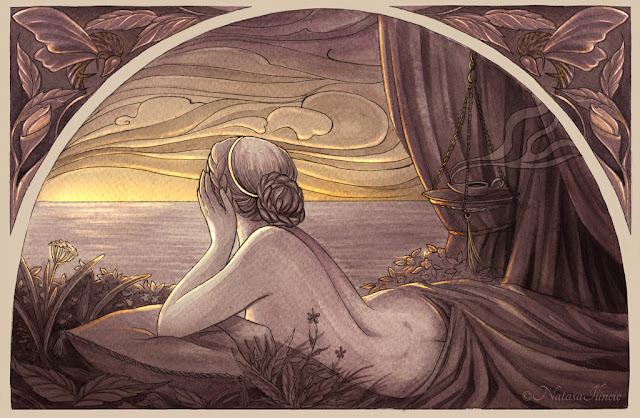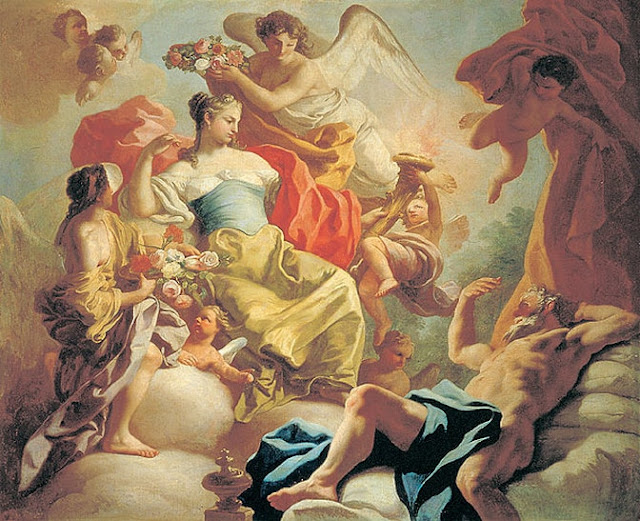AT the close of every night, rosy-fingered, saffron-robed Eos, a daughter of the Titans Hyperion and Theia, rises from her couch in the east, mounts her chariot drawn by the horses Lampus and Phaëthon, and rides to Olympus, where she announces the approach of her brother Helius. When Helius appears, she becomes Hemera, and accompanies him on his travels until, as Hespera, she announces their safe arrival on the western shores of Ocean.
b. Aphrodite was once vexed to find Ares in Eos’s bed, and cursed her with a constant longing for young mortals, whom thereupon she secretly and shame-facedly began to seduce, one after the other. First, Orion; next, Cephalus; then Cleitus, a grandson of Melampus; though she was married to Astraeus, who came of Titan stock, and to whom she bore not only the North, West, and South Winds, but also Phosphorus and, some say, all the other stars of Heaven.
c. Lastly, Eos carried off Ganymedes and Tithonus, son of Tros or Ilus. When Zeus robbed her of Ganymedes she begged him to grant Tithonus immortality, and to this he assented. But she forgot to ask also for perpetual youth, a gift won by Selene for Endymion; and Tithonus became daily older, greyer, and more shrunken, his voice grew shrill, and, when Eos tired of nursing him, she locked him in her bedroom, where he turned into a cicada.
1. The Dawn-maiden was a Hellenic fancy, grudgingly accepted by the mythographers as a Titaness of the second generation; her two-horse chariot and her announcement of the Sun’s advent are allegories. She evolved from the bloody-fingered Indian Mother-goddess Ushas.
2. Eos’s constant love affairs with young mortals are also allegoric: dawn brings midnight lovers a renewal of erotic passion, and is the most usual time for men to be carried off by fever. The allegory of her union with Astraeus is a simple one: the stars merge with dawn in the east Astraeus, the dawn wind, rises as if it were their emanation. Then, because wind was held to be a fertilizing agent, Eos became the mother Astraeus of the Morning Star left alone in the sky. (Astraeus was another name for Cephalus, also said to have fathered the Morning Star on her.) It followed philosophically that, since the Evening Star is identical with the Morning Star, and since Evening is Dawn’s last appearance, all the stars must be born from Eos, and so must every wind but the dawn wind. This allegory, however, contradicted the myth of Boreas’s creation by the Moon-goddess Eurynome.
3. In Greek art, Eos and Hemera are indistinguishable characters. Tithonus has been taken by the allegorist to mean ‘a grant of a stretching out’ (from teino and one), a reference to the stretching-out of his life, Eos’s plea; but it is likely, rather, to have been a masculine form oleos own name, Titonë-from tito, ‘day’ and onë, ‘queen’-and to have meant ‘partner of the Queen of Day’. Cicadas are active as soon as the day warms up, and the golden cicada was an emblem of Apollo as the Sun-god among the Greek colonists of Asia Minor.


Comments
Post a Comment